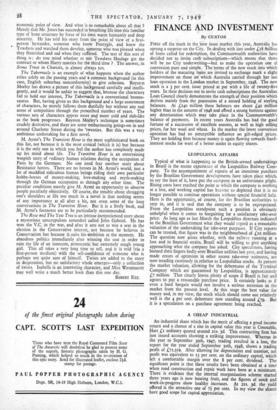FINANCE AND INVESTMENT
By CUSTOS
FIRST off the mark in the hew issue market this year, Australia has sprung a surprise on the City. In dealing with just under £18 Nihon of loans called for redemption, the Commonwealth authorities have decided not to invite cash subscriptions—which means that there will be no City underwriting—but to make the operation one of conversion pure and simple. The 'terms of the new stock into which holders of the maturing loans are invited to exchange mark a slight improvement on those on which Australia carried through her last loan operation in the London market in September, 1948. The new stock is a 3 per cent. issue priced at par with a life of twenty-five years. In their decision not to invite cash subscriptions the Australian Loan Council clearly demonstrate the strength of their position which derives mainly from the possession of a record holding of sterling balances. At L240 million these balances are about £40 million higher than in the autumn of 1948 and afford a strong buttress against any deterioration which may take place in the Commonwealth's balance of payments. In recent years Australia has had the good fortune of a succession of excellent seasons, as well as high selling prices, for her wool and wheat. In the market the- latest conversion operation has had no perceptible influence on gilt-edged prices. They are holding firm because money is again flowing towards fixed- interest stocks for want of a better outlet in equity shares.
LEOPOLDINA AFFAIRS
Typical of what is happening to the British-owned undertakings in Brazil is the recent experience of the Leopoldina Railway Com- pany. To the accompaniment of reports of an imminent purchase by the Brazilian Government developments have taken place which, to say the least of it, have put the company in an unfortunate plight. Rising costs have reached the point at which the company is working at a loss, and working capital has become so depleted that it is no longer possible to continue operations without special financial help. Here is the opportunity, .of course, for the Brazilian authorities to step in, and it is said that the company is to be expropriated. From the Leopoldina standpoint such a position is obviously unhelpful when it comes to bargaining for a satisfactory take-over price. As long ago as last March the Leopoldina directors indicated to the Brazilian Government what they would regard as a reasonable valuation of the undertaking for take-over purposes. If City reports can be trusted, that figure was in the neighbourhood of Do million. The question now arises whether, with the railway running at a loss and in financial straits, Brazil will be willing to give anything approaching what the company has asked. City speculators, having burned their fingers badly over Brazilian utilities last year, and having made errors of optimism in other- recent take-over estimates, are now treading cautiously in relation to Leopolidina stocks. At present the market valuation, allowing for the debentures of the Terminal Company which are guaranteed by Leopoldina, is approximately a million. That clearly leaves plenty of scope if Brazil is fair and agrees to pay a reasonable purchase price. It certainly looks as if even a hard bargain would not involve a serious recession in the market from the present level. At this stage the best value for money and, in my view, the stock which should come out relatively well is the 4 per cent. debenture now standing around £79. But it is a speculation on a purchase agreement being reached.
A CHEAP INDUSTRIAL
An industrial share which has the merit of offering a good income return and a chance of a rise in capital value this year is Constable, Hart LI ordinary quoted around 21S. 3d. This contracting firm has just issued accounts showing a striking improvement. Whereas in the year to September 3oth, 1947, trading resulted in a. loss, the report for the year ended September 3oth, 1948, shows a trading profit of £71,319. After allowing for depreciation and taxation, net profit was equivalent to 15 per cent, on the ordinary capital, Which left a comfortable margin over the 8 per cent. dividend. The significant point is that these results have been obtained at a time when road construction and repair work have been at a minimum. There is evidence that the internal reorganisation scheme started three years ago is now bearing fruit, and the figures of, stock and work-in-progress show healthy increases. At 21$. 3d. the yield offered is the attractive one of 7f per cent. In my view the shares have good scope for capital appreciation.






































 Previous page
Previous page